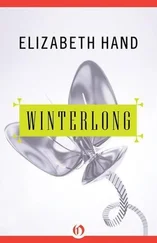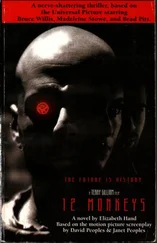The other picture was not nearly so old—three hundred years, perhaps. It was a holofile, set in a round frame of gold chromium brushed so that it had a rough veneer like wood. The ’file showed a dark landscape done in swirling blues and violets, a landscape thick with trees and watched over by a shining quarter-moon. As I stared at it, clouds passed across the moon’s face, turning the shadows beneath into slashes of black and indigo. But then the clouds moved on; the moon glowed brighter, revealing a scene much like that in the other painting. Only instead of hounds, there was a brace of aardmen, silvery monitors winking around their necks as they pursued something down a sharp incline into a ravine. I had to peer more closely to see what they hunted: a figure like a very tall man, but with a childish face and huge, heavily muscled arms that ended in disproportionately large hands.
“Ugh,” I said, drawing back. At my side Miss Scarlet craned her neck, trying vainly to make out what I saw. “Don’t,” I warned, pushing her gently down the hall in front of me. “It will spoil your appetite.”
“ Flight to the Ford,” the ’file whispered its title as we hurried past. Jane followed us with a rigid smile on her pale face.
“There seems to be a kind of theme here,” she said, fixing me with a fierce look. Before she could go on, Trevor appeared in a doorway ahead of us.
“Very nice,” he said. He looked at Miss Scarlet and me and murmured approvingly. He had changed into a kimono, a blue so deep, it was almost black. With his enhancer and his sharp features and silvery hair, he looked more like an elegant replicant than a human host. “Please, please come in,” he urged.
It was a splendid room; even Jane drew her breath in sharply as we entered. A rich burgundy-colored paper stamped with golden poppies covered the walls. In places mildew had eaten away at the pattern, but that only made it seem lovelier, more of a miracle that it had survived so long. A huge Oriental rug covered the floor, woven with plumes and arabesques of blue and gold. The edges had worn so that you could see the carpet’s weft, and beneath it the wooden floorboards shining with oil. A chandelier hung from the ceiling, some of its crystals missing. Thick red candles burned in empty sockets that had once held electric bulbs, and the wax dripped to congeal on a table that could have seated twenty, though only six places were set. I was wondering who the sixth could be when Fossa entered from another doorway. He walked in that mincing way that aardmen have, and I was surprised to see jewels glinting from his thick wrists—heavy bands of steel burnished to a glossy finish, set with amethysts and the holo-projecting lozenges called hyalines.
“Fossa—” Trevor indicated a seat, an elongated divan piled with pillows. The aardman hunched his shoulders, murmuring something unintelligible. He settled into the chair, his long legs drawn up beside him. I started when Trevor gently prodded my shoulder.
“Please, Wendy—” He pointed to a chair opposite Fossa. “Be seated.”
It was a strange meal. Giles and Trevor sat at opposite ends of the long table, with Miss Scarlet and me on one side and Jane and Fossa across from us. Above our heads the candles in the chandelier stayed lit, despite the tiny electric lights glowing from recesses in the walls behind us. Lakes of molten wax continued to spread across the scarred tabletop. In the background soft music played. I recognized the repetitive chiming voices, broken by bass notes like snarls. “The Eleusinian Chorus” by Marriette Greeves, something else familiar to me from HEL. A faint perfume of almond blossom filled the air, and wisps of smoke bore various smells from the kitchen—a pungent note of rosemary, the mellow scents of cumin and fenugreek and roasting garlic.
“You will try our wine, of course.” Trevor broke the uneasy silence, one eyebrow raised above the shining arc of his enhancer. Giles smiled and turned in his seat, beckoning to someone in the kitchen. A moment later a server appeared, the first I had seen since we arrived. It was far older than those we had used at HEL, walking on stiff steel legs jointed backward like those of a heron. Its metal torso gleamed. The black grid of its face had been painstakingly covered with an overlay of lenticular leaf that showed a soothing pattern of soft greens and blues, an effect reassuring to those aristocrats who had used the first-generation servers, and preferred this abstract effect to a crude effort at replicating a human face.
“Wine please, Mazda,” Giles ordered.
“Yes, master,” the server hissed, and crane-stepped back into the kitchen.
Trevor and Giles tried to draw us into conversation, but Jane was too wary and I was too exhausted to say much. Miss Scarlet and Fossa carried on a heated discussion of medical practices and ancient cinema. The aardman had adjusted the hyalines on his wrists so that blurred projected images appeared at the end of each of his thick, knobby paws—crude holos of a pair of perfect, milk-white hands with tapering fingers set with many rings, glowing with that slightly blurred aura that surrounds cheap, Archipelago-made hyalines. The projected hands moved perfectly with Fossa’s own. As he and Miss Scarlet spoke, I watched him, his hulking figure bent over the table, lifting his fork and knife with those ridiculously delicate fingers and bringing the food to his gnarled face. I stared fascinated, until Miss Scarlet shot me a disapproving glance and I turned back to my meal.
The food was odd, too. Not the wine, an earthy cabernet served in goblets of that mouth-blown violet glass made by abos in Wyalong—Trevor must have a fine cellar, with such crystal to match it. But after a sweet, soft white goat cheese served with lovage and rue (fresh herbs! in winter!) the server brought in platters that steamed and gave forth a heady, musky scent.
“Wendy.” Giles nodded at Mazda to indicate it should serve me first. “Please, help yourself—”
With steady, gleaming hands the server ladled out a dark broth. Small round objects swam in a rich sauce, heavily scented of juniper berries. I stared doubtfully at my plate as the replicant continued around the table, then passed back into the kitchen for the next course and began the whole process again.
“What—what are they?” I asked at last, poking at my plate with a knife.
“Mushrooms,” said Trevor. His enhancer sent lavender ripples dancing from his wineglass as he held it to the light.
“ Mushrooms?” said Jane.
“Mushrooms,” Miss Scarlet repeated avidly from where she balanced on a stack of books atop her chair. “How lovely!”
There were mushrooms in sauce; an aspic of tiny pink mushrooms like the tips of one’s fingers; a tray of what appeared to be slices of bread, but which were actually great round crescents of the sort of fungus one finds growing on trees. Across the table Jane gulped her wine and picked at several mushrooms stuffed with garlic and herbs, while next to her Fossa ate greedily, as did Trevor and Giles. I nibbled tentatively at one breadlike wheel and found it very bland. Still, I couldn’t quite bring myself to clean my plate, and like Jane I drank a lot of wine.
“They’re the only plants not affected by the mutagens,” Trevor explained between mouthfuls. “Everything else—corn, tomatoes, beans—we harvest half what we once did. Come winter we’re pretty much reduced to living on whatever herbs we can grow in the greenhouse. And even those don’t do very well in natural light—too much from the high end of the spectrum. So it’s gotten difficult to put things up. The tubers don’t keep the way they used to, and with the fruits we’re pretty much limited to eating them as fast as they fall from the trees—they practically spoil overnight.
Читать дальше












